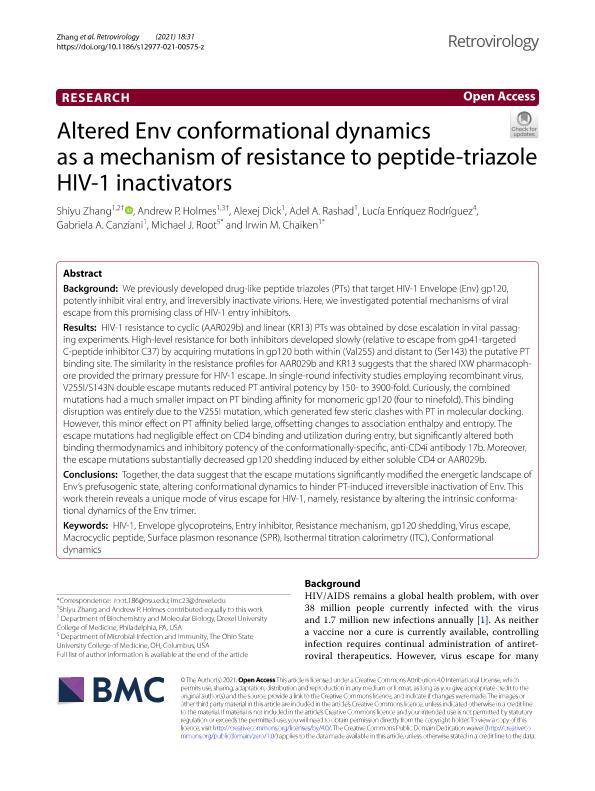Mostrar el registro sencillo del ítem
dc.contributor.author
Zhang, Shiyu
dc.contributor.author
Holmes, Andrew P.
dc.contributor.author
Dick, Alexej
dc.contributor.author
Rashad, Adel A.
dc.contributor.author
Enríquez Rodríguez, Lucía
dc.contributor.author
Canziani, Gabriela Alicia

dc.contributor.author
Root, Michael J.
dc.contributor.author
Chaiken, Irwin M.
dc.date.available
2023-09-19T12:53:36Z
dc.date.issued
2021-12
dc.identifier.citation
Zhang, Shiyu; Holmes, Andrew P.; Dick, Alexej; Rashad, Adel A.; Enríquez Rodríguez, Lucía; et al.; Altered Env conformational dynamics as a mechanism of resistance to peptide-triazole HIV-1 inactivators; BioMed Central; Retrovirology; 18; 1; 12-2021; 1-18
dc.identifier.issn
1742-4690
dc.identifier.uri
http://hdl.handle.net/11336/211966
dc.description.abstract
Background: We previously developed drug-like peptide triazoles (PTs) that target HIV-1 Envelope (Env) gp120, potently inhibit viral entry, and irreversibly inactivate virions. Here, we investigated potential mechanisms of viral escape from this promising class of HIV-1 entry inhibitors. Results: HIV-1 resistance to cyclic (AAR029b) and linear (KR13) PTs was obtained by dose escalation in viral passaging experiments. High-level resistance for both inhibitors developed slowly (relative to escape from gp41-targeted C-peptide inhibitor C37) by acquiring mutations in gp120 both within (Val255) and distant to (Ser143) the putative PT binding site. The similarity in the resistance profiles for AAR029b and KR13 suggests that the shared IXW pharmacophore provided the primary pressure for HIV-1 escape. In single-round infectivity studies employing recombinant virus, V255I/S143N double escape mutants reduced PT antiviral potency by 150- to 3900-fold. Curiously, the combined mutations had a much smaller impact on PT binding affinity for monomeric gp120 (four to ninefold). This binding disruption was entirely due to the V255I mutation, which generated few steric clashes with PT in molecular docking. However, this minor effect on PT affinity belied large, offsetting changes to association enthalpy and entropy. The escape mutations had negligible effect on CD4 binding and utilization during entry, but significantly altered both binding thermodynamics and inhibitory potency of the conformationally-specific, anti-CD4i antibody 17b. Moreover, the escape mutations substantially decreased gp120 shedding induced by either soluble CD4 or AAR029b. Conclusions: Together, the data suggest that the escape mutations significantly modified the energetic landscape of Env’s prefusogenic state, altering conformational dynamics to hinder PT-induced irreversible inactivation of Env. This work therein reveals a unique mode of virus escape for HIV-1, namely, resistance by altering the intrinsic conformational dynamics of the Env trimer.
dc.format
application/pdf
dc.language.iso
eng
dc.publisher
BioMed Central

dc.rights
info:eu-repo/semantics/openAccess
dc.rights.uri
https://creativecommons.org/licenses/by/2.5/ar/
dc.subject
CONFORMATIONAL DYNAMICS
dc.subject
ENTRY INHIBITOR
dc.subject
ENVELOPE GLYCOPROTEINS
dc.subject
GP120 SHEDDING
dc.subject
HIV-1
dc.subject
ISOTHERMAL TITRATION CALORIMETRY (ITC)
dc.subject
MACROCYCLIC PEPTIDE
dc.subject
RESISTANCE MECHANISM
dc.subject
SURFACE PLASMON RESONANCE (SPR)
dc.subject
VIRUS ESCAPE
dc.subject.classification
Virología

dc.subject.classification
Ciencias Biológicas

dc.subject.classification
CIENCIAS NATURALES Y EXACTAS

dc.title
Altered Env conformational dynamics as a mechanism of resistance to peptide-triazole HIV-1 inactivators
dc.type
info:eu-repo/semantics/article
dc.type
info:ar-repo/semantics/artículo
dc.type
info:eu-repo/semantics/publishedVersion
dc.date.updated
2023-09-14T17:24:18Z
dc.journal.volume
18
dc.journal.number
1
dc.journal.pagination
1-18
dc.journal.pais
Reino Unido

dc.journal.ciudad
Londres
dc.description.fil
Fil: Zhang, Shiyu. Drexel University; Estados Unidos
dc.description.fil
Fil: Holmes, Andrew P.. Drexel University College Of Medicine; Estados Unidos
dc.description.fil
Fil: Dick, Alexej. Drexel University College Of Medicine; Estados Unidos
dc.description.fil
Fil: Rashad, Adel A.. Drexel University College Of Medicine; Estados Unidos
dc.description.fil
Fil: Enríquez Rodríguez, Lucía. Universidad Francisco de Vitoria; España
dc.description.fil
Fil: Canziani, Gabriela Alicia. Consejo Nacional de Investigaciones Científicas y Técnicas. Oficina de Coordinación Administrativa Parque Centenario. Instituto de Ciencia y Tecnología "Dr. César Milstein". Fundación Pablo Cassará. Instituto de Ciencia y Tecnología "Dr. César Milstein"; Argentina
dc.description.fil
Fil: Root, Michael J.. The Ohio State University College Of Medicine; Estados Unidos
dc.description.fil
Fil: Chaiken, Irwin M.. Drexel University College Of Medicine; Estados Unidos
dc.journal.title
Retrovirology

dc.relation.alternativeid
info:eu-repo/semantics/altIdentifier/doi/http://dx.doi.org/10.1186/s12977-021-00575-z
Archivos asociados
